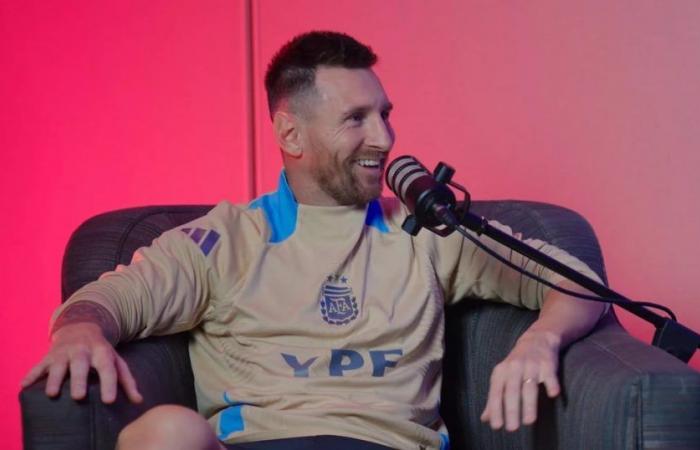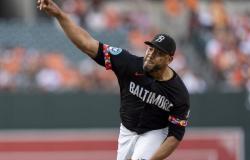
Lionel Messi He began to play a new tournament with the Argentine national team shirt. Despite the victory in the legendary Maracaná against Brazil and what it was like to win the World Cup in Qatar, the Rosario star faces the challenge of repeating the Copa América title together with his teammates in the United States.
Waiting for the match against Chile in the group stage to be played in the stadium Metlife from New Jersey, a new interview from Argentina’s number 10 was published. In dialogue with Juan Pablo Varsky on his streaming channel Clank!Messi reviewed his history in a football talk in which he gave several definitions: his beginnings at Newell’s, his arrival at Barcelona and how his relationship with Guardiola began.
Furthermore, the Inter Miami player He confessed his desire to meet Michael Jordan, provided details of what the definition against France was and the key role that Rodrigo De Paul hadwhom he compared for his way of being with Pocho Lavezzi, when it came to joining the group that was formed by Lionel Scaloni and held the World Cup at the Lusail in Qatar.
The definitions of Lionel Messi
The photo with Jordan: “It seems to me, on a sporting level, to be the grossest thing there is. After having seen his series and knowing a little more, it is impressive. That brought me much closer and to know more about what he was and it is a shame that he was not able to live that time. I would have loved to see it live. The truth is that I don’t know much about basketball nor am I a big fan, but I think it was something different in all sports, not just basketball. It is a great admiration… they asked me for so many photos, and having one with him would be really nice.”
The reasons for his “walks” on the court: “I see the opponent’s positioning, how they stand still when we don’t have the ball. We in Barcelona, who were always protagonists, and now in the national team. I try to do that, stay away from the mark, get out of the game and what is happening so that, if we recover, we can be well profiled or alone, and have time to start a counterattack or a play. I generally study how the opponent stands when he attacks.”
Why are you so self-critical?: “I was always very self-critical, I think I am the first one who knows when I do things right or wrong. During the game I try to never leave. There are many times when I don’t participate but I don’t stop being involved in the game and seeing what is going to happen and I try to talk to myself and not leave the game. Many times I get insulted by some plays. I tell myself everything. For example, in the World Cup play (which ended in a goal for France) I wanted to kill myself, because although it was a loss far from our goal, it was a ball that I lost because I wanted to make one too many, for not trying to go forward and because Also when I wanted to take the last little step the ball was far away from me and they took it away from me. But yes, in the same match I am self-critical of myself and I try to improve myself and get back in touch with the ball to get back into the game.
The ball that was lost in the World Cup final and ended in a 2-2 draw for France: “Even if I lost it up high, I could have been far from the goal, but you feel guilty and that day I was very angry about having lost that ball and that this had happened after the game we had been having.”
His change of outlook in the face of defeats: “Over time you learn from defeats, that’s hard because there are defeats that are difficult to overcome or I, at least, don’t like to relive them. But in the long run it helps and makes you grow. Since the arrival of my first child, my way of seeing defeats changed a lot. I would lose a game and I could be locked up for two or three days without wanting to talk to anyone, going to train badly, with my head thinking about everything. But when Thiago arrived it changed everything for me, coming home and seeing him made me forget a little about what had happened.”
His crying after his first game with the National Team: “I remember that I touched two or three balls. I had made a start before the play they kicked me out, very similar, but I didn’t understand anything when they had kicked me out because it had happened to me a lot of times where they grabbed me and wanted to get it off of them. The referee didn’t have any tact either, he simply threw me out, which wasn’t a red card either. It was very hard for me because it meant my debut, my first game and for it to be that way. I entered the locker room dead, they couldn’t contain me, but the locker room supported me a lot, Kily (González) told me: “The same thing happened to me and then I played in five games for the national team.” He was very affectionate, he attached himself to me and took care of me, both he and everyone. Scaloni also said that he had given me the first pass.”
Why is it so competitive?: “Competitiveness is never going to go away. I am like this, I was born like this and it is very difficult for me to leave. It’s hard for me to even let my children win, maybe the UNO thing was to make him warm up. They don’t like to lose anything, they are very similar to me. It’s good to be competitive too, but I learned to know how to lose, to get positive things out of defeats, and I understood that there are more times you lose than you win. Soccer is a sport where you can be 10 times better than your rival and you can lose. The best team in a competition is not champion nor does it reach the final. There are things in football that are very difficult to find an explanation for.
De Paul’s key role in his arrival to the new group: “It happened to me that it was very difficult for me to return to the national team after what happened because they were all new, because I didn’t know any of them personally. It is very difficult for me to enter groups because of the way I am, even though I spent a lot of time in the national team. It cost me. They had already played a couple of friendlies and won a couple of games, they already knew each other, and it was also like the beginning of a new generation for them. At that moment Rodrigo helped me a lot because of his way of being. I remember that when I met him he reminded me a lot of Pocho (Lavezzi), he was very similar, very happy and very good for the group. He made us all bring out the best in us. The first day he approached me, we were talking, with Ota (Nicolás Otamendi) too. He got me into the group much quicker than I ever imagined. I think it was a help for both sides, that he integrated me into the group and my stance of getting rid of my shame and trying to be the one to take the step to approach the boys as well, because it was something new for everyone and it was very easy right away. because when there are good people it is much easier.
The change after 2019: “I think that when the group felt stronger and prepared for great things was after the Copa América. Scaloni decided to change tactics because of Qatar’s way of playing and because it was a match where we had to win to advance. Being realistic, we contributed little defensively, but we had no choice but to go for the game and win with Lautaro and Kun. We had the means at that time to do it and luckily we won and I think we felt comfortable playing that way. Already with Brazil we feel that we played a great game (in the final). That beyond the result we were superior in the game. From there it happened. We found some wonderful media, where the majority at some point was hooked and that is very noticeable. When you have a lot of possession, the hooker is generally a different player who loses few balls and we in the middle begin to lose little and have many possessions. From there we became stronger. Although it is true that today the hooks no longer exist, all the media are very good and we find a little of what Xavi, Iniesta and Busquets were, without buying, we find it in the national team as well. I don’t like to compare, but in the previous teams we had very good games: in the 2016 Copa América in the US that team played very well with Ever, me… But in this one it was a bit of everything.”
The worst dressing room of his career: “2016 was the worst locker room in terms of sadness. It was the third in a row. We had had a very good Copa América, reaching the final being much superior. In that final against Chile, we were superior at the level of play, and we lost again on penalties. As a result of all that, what happened to me and my statement. When I missed the penalty I wanted to kill myself because it was the first penalty, the one that put us ahead. I wanted to hit him hard when I knew it wasn’t necessary, that I was clear that I knew Bravo and well, that’s when I beat myself up for not being able to put the team ahead after they had made a mistake.”
When he decided how he was going to take the penalty in the World Cup final: “I thought about being calm, about not betraying myself, not rushing, not wanting to kick quickly. Being convinced to continue kicking the same way I kicked the previous ones, and so I did.”
Its importance with statistics: “I don’t pay attention to statistics, nor to assists or goals, much less to GPS (sorry to the teachers). I never cared how much I ran in a game or how fast I ran, or how much they watched. I know that it can be important and can help them on a day-to-day basis due to the training load, but personally I was never a big friend of that.”
The meaning of physical care: “Today I give a lot of importance to the physique. In 2014 I felt that I had to make a change, I was not feeling well and I felt that I could get much more out of my physique and Martín made me meet the doctor I had been going to for a couple of years and I learned a lot from him. Then I added and changed things, going back to doing things I did before. A lot depends on the trust of the person who guides you and tries to help you. Also know what is good for you, what is not. I tried to grow in that aspect, in prevention, in care, in the hamstrings that I had many injuries. Do strength work, I never did much of that, in the gym. Add everything that can help to continue performing. I always train to the maximum. Today I know myself physically and I know when I can give 100 in a training session, but many times when a training session or a championship begins I always want to win or it bothers me not to win.”
His resistance to kicks: “I always played with older kids, they always kicked me because of anger, fever or for trying to get the ball from me and arriving late. I always tried to continue and play and have the ball. I like to have the ball at my feet, to generate, to have things happen when I have it and the more fluid the game is and the less it stops also helps my game.”
The value of the Selection group: “When there are strong and good groups there is no problem in insulting a teammate, as long as it is for the good of the team and the group, I think it can happen. We have the opportunity to be in a very good and very united group that gets along very well and it can happen, but nothing happens”
When he recognized that he was a good player: “When I started playing I was not aware. I loved football like most, from a very young age. Beyond my responsibilities. I always tried to have fun. Even more so now. After achieving all the objectives, today after having achieved everything, I am enjoying myself like that boy. I know that there is less and less to go and the years that I have left are fewer.”
His relationship with Guardiola: “I was half renegade, with a long face, I wanted to go play in the Olympic Games. He is a very intelligent person, he realizes everything. I am very transparent, and he got to know me quickly. That’s why he immediately grabbed me, but more or less it happened and he told me ‘go win the Games, enjoy yourself and come back.’
Pep’s way of being: “I was in everything. The care, rest, food, but it wasn’t that strict either. He would lower a line and teach us what was best. But then it depended on each one. If we all start eating together at the club. There you already ate differently. But hey, when you’re young, you don’t realize it. Today I change. The player starts to take care of himself when he is younger.”





